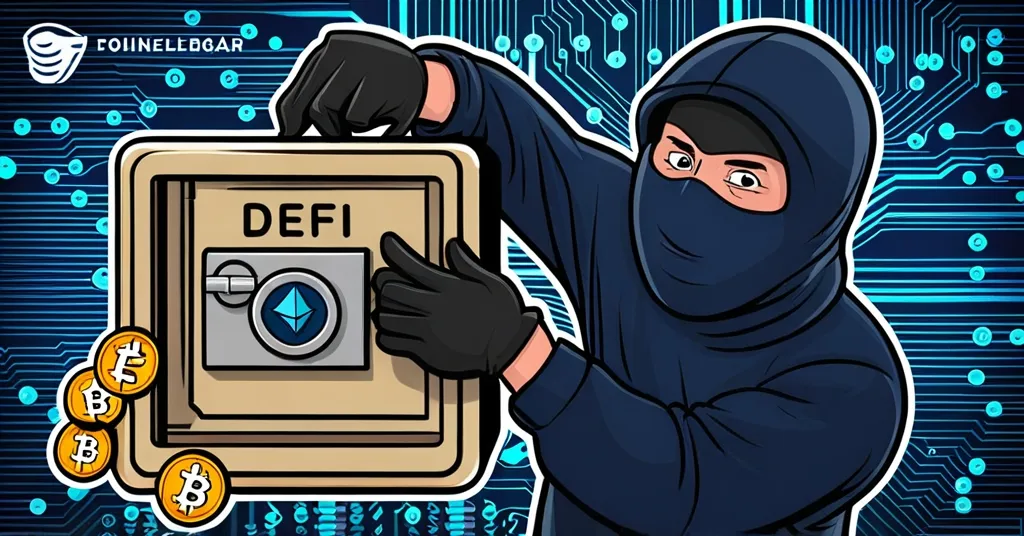UniLend Finance Exploit: $197K Stolen in DeFi Hack on Ethereum

UniLend Finance Exploit: $197,000 Stolen in Latest DeFi Security Breach on Ethereum
UniLend Finance, a decentralized finance (DeFi) protocol on Ethereum, suffered a significant exploit on January 12, resulting in a loss of approximately $197,000. The attackers exploited a vulnerability in the “redeem process” of the protocol, demonstrating the ongoing security challenges within the DeFi sector.
- UniLend Finance exploited for $197,000 on January 12
- Attackers manipulated “redeem process” to drain stETH pool
- DeFi sector faces ongoing security challenges
The UniLend Finance Exploit
UniLend Finance operates on the Ethereum blockchain, providing a platform for decentralized lending and borrowing through smart contracts. Smart contracts are self-executing contracts with the terms directly written into code. The exploit zeroed in on the “redeem process,” a mechanism that allows users to withdraw their deposited assets. The attackers manipulated the share price calculation, which let them trick the system into thinking they had more collateral value than they actually did. This manipulation enabled them to drain the entire pool of Lido Staked Ether (stETH), a tokenized form of staked Ethereum.
The exploit unfolded at 11:19:59 AM UTC, with the attackers making off with a combination of USDC and stETH. USDC is a stablecoin pegged to the US dollar, commonly used in DeFi for its stability. Initial losses were reported at $196.2K by TenArmorAlert, a real-time web3 security startup, and later updated to $197.6K by SlowMist, a web3 security firm. As of the time of writing, UniLend Finance had not issued an official response to the exploit but confirmed the incident on their official X page, reporting a loss of approximately $200K, which is about 4% of their $4.7M Total Value Locked (TVL). They advised users to avoid depositing into UniLend V2 while reassuring that funds in UniLend V1 remain “SAFU” (Secure Asset Fund for Users).
Other 2024 DeFi Exploits
UniLend Finance’s exploit is part of a troubling trend in 2024, where the DeFi sector has been the target of approximately 60% of all exploits and scams. This year saw major breaches, including Radiant Capital, which lost a staggering $50 million in an attack allegedly executed by the notorious Lazarus Group. Another significant incident occurred with Thala Protocol, where $25.5 million was drained, but the attacker agreed to return the funds in exchange for a bounty. These incidents illustrate the vulnerability of DeFi protocols and the potential for significant financial losses.
The Broader Implications for DeFi
The DeFi sector, while revolutionary in its pursuit of decentralized financial services, remains plagued by security challenges. Smart contract vulnerabilities, like the one exploited in UniLend Finance, continue to be a critical concern. As we advocate for decentralization, freedom, and privacy, it’s essential to recognize that these ideals must be balanced with robust security measures. Bitcoin, as the cornerstone of sound money, may not face these same vulnerabilities, but the broader crypto ecosystem, including altcoins and other blockchains, plays a crucial role in financial innovation. Embracing effective accelerationism means pushing the envelope of what’s possible, but also addressing the dark side where exploits and scams threaten to undermine our shared vision.
Community Response and Future Steps
In a bold move, UniLend Finance offered a 20% bounty to the attacker for the safe return of the stolen funds. This proactive approach adds a ray of hope amidst the turmoil and showcases the DeFi community’s resilience and willingness to rally together to mitigate damage. However, the exploit underscores the need for more rigorous auditing and enhanced security protocols. As we navigate these challenges, staying informed and vigilant is crucial. The promise of DeFi is undeniable, but so are its pitfalls, which demand continuous improvement and adaptation.
Technical Details of the Exploit
The attackers exploited UniLend Finance by depositing USDC and stETH, borrowing all the pool’s stETH, and then redeeming their deposits without repaying the borrowed tokens. This manipulation of the “redeem process” allowed them to artificially inflate their collateral value and drain the pool. Lido Staked Ether (stETH) is a liquid staking solution that aims to provide transparency and security through open-source development and continuous code review. However, staking with Lido carries inherent risks such as smart contract vulnerabilities and technical risks related to Ethereum’s development, which were exploited in this case.
Key Takeaways and Questions
- What was the method used to exploit UniLend Finance?
The attacker exploited a vulnerability in the “redeem process” by manipulating the share price calculation, allowing them to artificially inflate their collateral value and drain funds from the pool.
- How much was lost in the UniLend Finance exploit?
The total loss was estimated at approximately $197,000, with initial estimates at $196.2K and later updated to $197.6K.
- What other major DeFi exploits occurred in 2024?
In 2024, significant exploits included Radiant Capital, which lost $50 million to an attack allegedly executed by the Lazarus Group, and Thala Protocol, which was drained of $25.5 million but saw the attacker agree to a bounty and return the stolen assets.
- What percentage of exploits and scams in 2024 targeted the DeFi sector?
Approximately 60% of all exploits and scams in 2024 targeted the DeFi sector.
- How have the exploited protocols responded to their respective incidents?
UniLend Finance offered a 20% bounty and advised users to avoid depositing into UniLend V2, while reassuring that funds in UniLend V1 are safe. Radiant Capital was targeted by a sophisticated attack leveraging impersonation and malware. Thala Protocol negotiated the return of stolen assets via a bounty payment.



